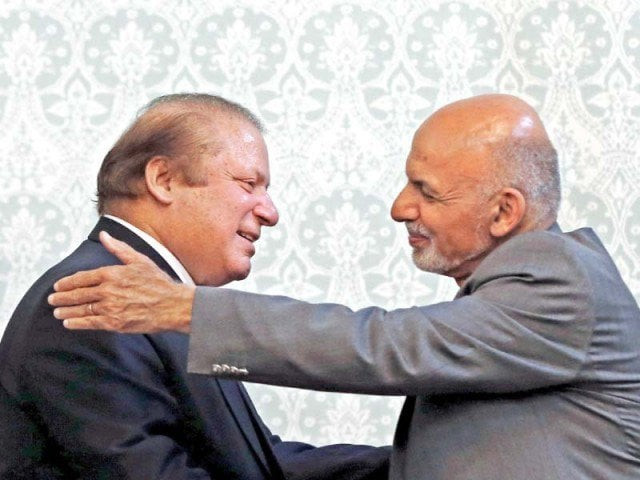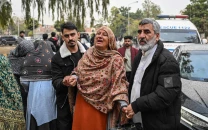Pakistan-Afghanistan’s London rendezvous is over, now what?
Success depends on how well steps for cooperation against terrorism, border management, trade are implemented.

In this file photo, Afghan President Ashraf Ghani meets Prime Minister Nawaz Sharif. PHOTO: REUTERS
While the exact details from the London meeting are not revealed, Afghanistan and Pakistan have reportedly agreed on a mechanism for cooperation against terrorism and showed a willingness to continue peace dialogue, take confidence-building measures to ease tensions and hold intelligence meetings at the operational level.
The meeting was a step in the right direction, but the success of these talks depends on how well the agreed measures are implemented particularly those pertaining to cooperation against terrorism, border management, and trade ties.
Cooperation against terrorism
Islamabad has been vocal about certain militant groups, which escaped military operations in Pakistan, having safe hideouts in Afghanistan. Kabul, on the other hand, believes the Afghan Taliban have sanctuaries in Pakistan.
Diplomatic sources say Pakistan and Afghanistan have agreed to address each other’s concerns about security in the wake of London talks. The two countries have been collaborating against Islamic State and reports suggest they have now agreed to pursue wanted terrorists as well, a list of which was swapped last month after multiple terror attacks in Pakistan were traced back to Afghan soil. Further, the two countries have agreed to hold intelligence officials’ meeting and revamp military-to-military cooperation – this will help them in taking action against terror sanctuaries and militants after verification of intelligence information.
While these measures appear inevitable on paper, their implementation will be a challenging task given the level of mistrust between Pakistan and Afghanistan especially Islamabad’s concerns about the influence of hostile countries in Afghanistan. These doubts were reinforced two years ago when the National Directorate of Security – Afghanistan’s prime intelligence agency - refused to sign a bilateral memorandum of understanding on intelligence-sharing at the last moment even though everything was already finalised.
This not only contributed to the trust deficit between the two countries but also made it easier for terrorists to continue with their rampage. Now that Pakistan and Afghanistan are in the process of agreeing over counter-terrorism mechanism, they need to sign the agreement as it will play a positive role in increasing trust.
Additionally, Pakistan must take steps to address Kabul’s concerns related to Afghan Taliban and ensure its territory is not used against any country. Both the nations should also immediately stop rhetoric against each other as the first step in confidence building.
Border issue
Cross-border attacks have been a long-standing concern for both Pakistan and Afghanistan. In the last two weeks alone, seven Pakistani soldiers and 21 militants have been killed in Mohmand and Khyber agencies. Hideouts in and free movement of terrorists from Afghanistan is another border aspect which worries Islamabad.
While Afghanistan agrees better border management is the immediate need, it has however expressed reservations over Pakistan’s attempt to secure borders through fencing and gates. In June last year, Pakistan and Afghanistan forces clashed near Torkham border in reaction to a construction on the Pakistani side. With Afghanistan’s continued reluctance in this regard, Pakistan has no way to stop attacks from Afghan soil except by arbitrarily closing the border as done after the terror attack on the shrine of Lal Shahbaz Qalandar in Sehwan.
In addition to intelligence-sharing, Pakistan and Afghanistan need to chalk out an efficient system for legal border crossing with measures such as collection of biometric data and strict inspection of travellers on both sides. Also, there should be coordinated deployment of troops along the border especially during military actions to ensure terrorists have nowhere to escape. Further, Pakistan and Afghanistan must negotiate terms for fencing the border and immediately start working on it.
Trade
Closely related to the border issue is the Pakistan-Afghan trade which is estimated to be worth $2.28 billion annually. Tensions between the two countries and frequent closing of the border have negatively impacted the trade and many Pakistan-Afghan traders are believed to be shifting their businesses away from Pakistan due to the strained ties. Afghan transit containers passing through Pakistan have fallen from 75,000 in 2010 to less than 50,000 in 2016 and total losses for the last three years reportedly run in billions of dollars.
In the last eight months alone, the Pakistan-Afghan border was closed five times. The latest blockade, following the Sehwan attack, left around 5,000 trucks stranded near Torkham and Chaman borders. Traders on both sides incurred about $100 million worth of losses in just a few days as some of them deal only in perishables.
Trade between Pakistan and Afghanistan must be protected as it facilitates people-to-people interaction and as a result can help improve ties. To restore confidence among traders, Islamabad can offer better trade facilities such as less-expensive storage space, improved roads and decent accommodation. The time-consuming bureaucratic process of transporting goods, which often leave traders stranded in one place, should also be simplified.
Though diplomatic sources from the two sides said Pakistan-Afghan talks would have a positive impact on trade ties, the complexities of the matter may delay any real outcome. However, reopening of the border on humanitarian grounds is a positive development following the London meeting.
Imdad Hussain is an Islamabad-based journalist specialising in diplomatic and security issues.


















COMMENTS
Comments are moderated and generally will be posted if they are on-topic and not abusive.
For more information, please see our Comments FAQ